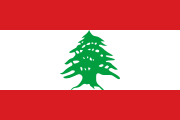Portal:Lebanon
The Lebanon PortalA view of Byblos, Lebanon
 Lebanon, officially the Republic of Lebanon, is a country in the Levant region of West Asia, bordered by Syria to the north and east, Israel to the south, and the Mediterranean Sea to the west; Cyprus lies a short distance from the country's coastline. It is at the crossroads of the Mediterranean Basin and the Arabian Peninsula. Lebanon has a population of more than five million and an area of 10,452 square kilometres (4,036 sq mi). Beirut is the country's capital and largest city. Human habitation in Lebanon dates to 5000 BC. From 3200 to 539 BC, it was part of Phoenicia, a maritime empire that stretched the Mediterranean Basin. In 64 BC, the region became part of the Roman Empire, and later the Byzantine Empire. After the 7th century, it came under the rule of different caliphates, including the Rashidun, Umayyad and Abbasid Caliphate. The 11th century saw the establishment of Crusader states, which fell to the Ayyubids and the Mamluks, and eventually the Ottomans. Under Ottoman ruler Abdulmejid I, the first Lebanese proto-state, the Mount Lebanon Mutasarrifate, was established in the 19th century as a home for Maronite Christians, in the Tanzimat period. Lebanon is a developing country, ranked 112th on the Human Development Index. It has been classified as an upper-middle-income state. The Lebanese liquidity crisis, coupled with nationwide corruption and disasters such as the 2020 Beirut explosion, precipitated the collapse of Lebanon's currency and fomented political instability, widespread resource shortages, and high unemployment and poverty. The World Bank has defined Lebanon's economic crisis as one of the world's worst since the 19th century. Despite the country's small size, Lebanese culture is renowned both in the Arab world and globally, powered primarily by the Lebanese diaspora. Lebanon is a founding member of the United Nations and of the Arab League, and is a member of the Non-Aligned Movement, the Organization of Islamic Cooperation, the Organisation internationale de la Francophonie, and the Group of 77. (Full article...) This is a Featured article, one of the best articles Wikipedia has to offer.
The 1940 association football match between the national teams of Mandatory Palestine and Lebanon was the latter's first official international match, and the former's last before they became the Israel national team after 1948. The match took place on 27 April 1940 at the Maccabiah Stadium in Tel Aviv. Officiated by John Blackwell of the British Army, the game was watched by 10,000 spectators and ended in a 5–1 victory for the home side. Mandatory Palestine scored in the second minute of the game, doubling their lead 10 minutes later with a penalty kick. Two more goals by the home side meant the first half ended 4–0. Mandatory Palestine's forced substitution at half-time due to injury hampered their control of the game and in the fifth minute of the second half, Lebanese forward Camille Cordahi scored to become Lebanon's first official international goalscorer. Werner Kaspi scored his second goal of the game in the 60th minute, with the match ending 5–1. Lebanon's next official games were all friendlies against Syria, one in 1942 and two in 1947. In 1948 the Mandatory Palestine national team formally became the Israel national team, with the establishment of the State of Israel. They played their next official game in a friendly against Cyprus in 1949. Out of Lebanon's 11 players, six went on to play at least one more international game. Shalom Shalomzon was the only Mandatory Palestine player to make another international appearance. (Full article...) Did you know (auto-generated) -
TopicsRelated portalsReligions in Lebanon Arab states Other countries This is a Good article, an article that meets a core set of editorial standards.
Lebanon has never participated in the Eurovision Song Contest. The country's broadcasting organisation, Télé Liban, was set to make the country's debut at the Eurovision Song Contest 2005 with the song "Quand tout s'enfuit" performed by Aline Lahoud, but withdrew due to Lebanese laws barring the broadcast of Israeli content. (Full article...) General imagesThe following are images from various Lebanon-related articles on Wikipedia.
CategoriesAssociated WikimediaThe following Wikimedia Foundation sister projects provide more on this subject:
SourcesDiscover Wikipedia using portals |
























































